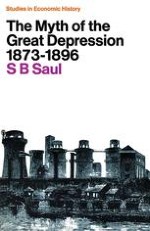1969 | OriginalPaper | Chapter
Agriculture
Author : S. B. Saul, B.Com., Ph.D.
Published in: The Myth of the Great Depression, 1873–1896
Publisher: Palgrave Macmillan UK
Included in: Professional Book Archive
Activate our intelligent search to find suitable subject content or patents.
Select sections of text to find matching patents with Artificial Intelligence. powered by
Select sections of text to find additional relevant content using AI-assisted search. powered by
NOW we must turn to look at the economy as a whole after 1870, but before tackling our major problem, the decline in industrial growth, we must spend a short time with the agricultural industry, which was once considered the main victim of the ‘Great Depression’. It is true that there was a sharp fall in the numbers engaged in agriculture in Great Britain — from 1.6 m. in 1871 to 1.4 m. in 1891 and 1.3 m. in 1901 — but this was nothing new and indeed the largest absolute fall in numbers came in the 1860s. Some sectors of agriculture did suffer seriously from the fall of prices and the industry had to bear all the problems of an extensive structural change taking place over a short space of time with little or no relief from the Government. The difficulties were accentuated, too, by a run of exceptionally bad seasons in the late 1870s. Wheat-producers felt the blasts most savagely. In 1867–76 this crop accounted for 13 per cent of the gross agricultural output of the U.K.: by 1894–1903 it was 4 per cent. In England the fall was from 22 to 7 per cent. Although the prices of oats and barley fell in a similar fashion, most farmers continued to grow these crops to provide fodder and essential straw.
